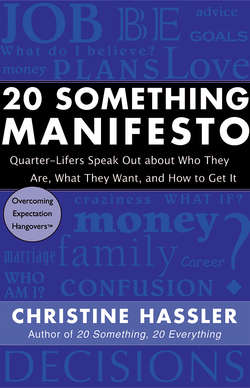Читать книгу 20 Something Manifesto - Christine Hassler - Страница 33
На сайте Литреса книга снята с продажи.
YOUR EXPECTATION OR MINE?
ОглавлениеAn important step in identifying and treating Expectation Hangovers is to understand whose expectations are creating pressure or confusion in your life. Are you suffering because you’ve disappointed yourself or someone else? Part of maturing is discerning the expectations of others from the goals you set for yourself. This is one of the main challenges for twenty somethings, and it’s the cause of much of the unhappiness they report.
As a twenty-seven-year-old shares: “I have lived the past several years fulfilling expectations (like getting married) I felt were being placed on me by my family. Their wishes and needs superseded my own, but now I feel trapped in this life that I half-willingly created for myself. All I want to do is make my own life what I want it to be, without other people weighing in with their disapproval or opinions. I am independent and wish to remain so, but ironically I conformed to what my family and others around me expected. Now, I’m struggling to get out of a life I don’t want and that is turning out to be harder than I thought it would be.”
I see many twenty somethings exhausting themselves trying to create a life that someone else — especially parents — wants for them. Living your life according to your own plan is part of becoming an adult. No matter how challenging it seems, you do have the courage and strength to take a stand for who you are and what you want — or against who you do not want to be and what you don’t want. Remember, this is your life.
“I learned that the most stressful thing in my life was my tenacity at holding on to all of the ‘shoulds’ in my life. Shoulds only matter if you’re considering other people’s standards and milestones. I decided it was important to live by my own timeline and gave myself permission to go at my own speed. Life is a wonderful, mysterious process, and my only expectation these days is that everything will unfold as it should. My job is to be true to myself and work at the things I know will make me happy. Everything else will work out around me.”
Web developer and life coach, 29, married, Colorado
In addition, members of the instant-gratification generation are likely to spend a large part of their twenties striving for external gratification, expecting that it will make them feel happy and successful. A hot car, a gorgeous date, a nice income: that’s what life is all about, right? But even when they gather all the necessary comforts to live the “expected” life, they can wake up with a huge Hangover because they never stopped to question whether these were things they really wanted. Plus, when emotional gratification is consistently attached to external things and a lifestyle, when do you learn how to generate satisfaction from within?
Another twenty-seven-year-old says, “Upon graduating from college I began working for the company I wanted and moved into my own one-bedroom apartment. I started dating a doctor who drove me everywhere in his BMW. I had a great social life, going to all the hottest clubs, eating at some of the best restaurants, and I shopped for new clothes every week. I had fulfilled all my expectations. From the outside my life seemed grand, but I was not truly happy. I felt empty, unfulfilled, unsatisfied, and I couldn’t figure out why for the life of me.”
This type of “I did everything I was supposed to do, so what gives?” Hangover is extremely common, since our consumer culture consistently sells and validates the importance of stuff. Expectations about the stuff we should own have replaced our “dreams” about who we should be. It’s hard to even know what our dreams are when our lives are so focused on fulfilling expectations. In part 2, we’ll dig into the question of our dreams and desires even more. But first, here’s a way to help distinguish your own expectations from those of others, whether they are presented by relatives, friends, or society.
EXPECTATION IMPLANTS
Write a list of every expectation you can think of: all the things that are expected of you by others, that you expect from life, or that you expect yourself to achieve. After you write the list, circle anything that may be an “expectation implant” — meaning that it reflects a belief that you don’t agree with or that does not belong to you. It may be something someone else wants or something you bought into based on messages from parents, peers, or society. Also circle any expectations of a desired feeling from a desired result. For example, circle any sentence like “I expect to feel more peaceful once I’m married.”
Next, look at all the expectations you circled: what are you doing (or torturing yourself thinking you should be doing) based on these expectation implants? Is this serving you? If you removed these expectations from your life, how would you feel? Would you do anything differently? Write down a list of these differences, and use it to take a stand for what is true for you — even if someone may be disappointed!
Then look at all the expectations you did not circle, the nonimplants. What action steps can you take to transform those expectations into goals? See the “Clarifying Goals” exercise (page 36), and create a list of achievable actions. As you start to bring more awareness and energy toward your internal, authentic desires and goals, it will become easier to move away from external expectations.
